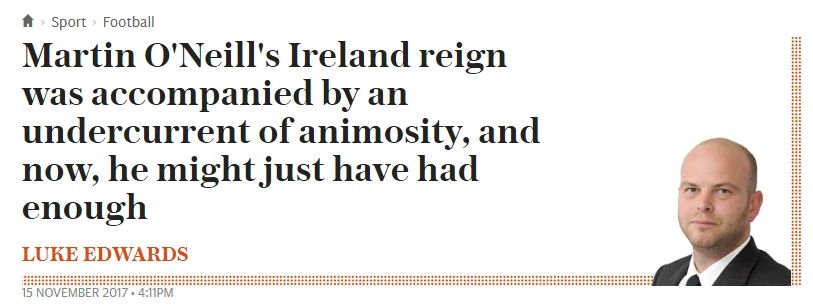


 What could we possibly expect? We're Ireland. Presumably that is the mindset.
So, when Stephen Finn compiles stats that show only Andorra, San Marino, Liechtenstein, Gibraltar and Luxembourg completed, on average, fewer passes per game than Ireland in the World Cup qualifiers, Ireland fans should just accept that because they're Ireland.
What could we possibly expect? We're Ireland. Presumably that is the mindset.
So, when Stephen Finn compiles stats that show only Andorra, San Marino, Liechtenstein, Gibraltar and Luxembourg completed, on average, fewer passes per game than Ireland in the World Cup qualifiers, Ireland fans should just accept that because they're Ireland.
"Ireland are, on paper, a team that would struggle to stay in the Premier League," Edwards writes. Good job we're not competing in the Premier League so. "If you were being cruel, you might suggest they are one that would struggle to get out of the Championship given that only five of the starting line-up – Robbie Brady, Jeff Hendrick and Stephen Ward at Burnley, Shane Duffy at Brighton and Harry Arter at Bournemouth - started for their Premier League clubs the weekend before the international break."You can do whatever you want with stats like that. Ciaran Clark is a regular for Newcastle, Seamus Coleman is injured, and James McClean, the seventh Premier League player who started against Denmark, is used every week and he's hardly gone backwards. This is the same argument used to write off Wes Hoolahan. He's on the bench every other game for Norwich so, for some, it's enough to dismiss him even though the evidence is right there before your eyes that he's by far and away the most creative player when he's given a chance. It's a nonsense argument in truth, it actually means damn all. Tom Cleverley plays all the time in the Premier League. Glenn Whelan spent a career there. Jesse Lingard and Danny Welbeck aren't regular starters for their clubs but England have no problem investing their trust in them. Dominic Solanke got his first cap whilst Joe Hart has played 75 times for his country and he's a multi-millionaire Premier League champion. What does it really mean? Who are your best footballers? That should be the only question whether boys play 90 minutes or not for their clubs. There are inconsistencies all over the place and managers can be wrong too.
"Much like the English, the Irish have an inflated opinion of how good their players are and a strange sense of entitlement when it comes to judging the fortunes of the national team," Edwards' most insulting line read. "Ireland did well to get a play-off place, yet O’Neill is slaughtered for failing to win it."O'Neill is not slaughtered for failing to win it. He's slaughtered for losing 5-1. At home. To Denmark. He's slaughtered for the half time substitutes which completely threw the game away when one goal was all Ireland needed to be right back in the shake-up. He's slaughtered for, if anything, going too gung-ho and not being cautious enough when he ripped the anchor out from the side. The two first half goals were beyond his control - no-one disputes that. The reaction to it though was all on him and it was all wrong. There's nothing near the demands of the English here. Nowhere in the world would a country have been so unified watching a stifling performance in Denmark. Everyone lapped up that slug-fest and we praised the team for 'getting the job done' in the first leg away from home. There was an acceptance - an appreciation even - of the negative impact Ireland can have on rivals but, when that ship sailed, five goals were shipped. When that happens, questions get asked. Sorry, but that's the deal. When those questions are not answered, the rest of the dropped points are mulled over. Georgia, home games with Austria, Wales and Serbia - games Ireland never once tried to win. The stat doing the rounds is that O'Neill has lost four times in 24 qualifiers but there have been nine draws in that time too and there seems to be a complete disbandment of the idea that a team of Irish lads could pass the ball to each other. No-one's lumping in this pile-on because of missing out on World Cup qualification - the Irish expectations, contrary to what Edwards thinks, aren't as inflated as the English, not even relatively - but it's the manner of the defeat and it's how the side went down without even thinking about swinging on the way. And it's how that's happened too often in this campaign that hurts. Whether you think Ireland would struggle in the Premier League or not is irrelevant to those feelings. International football is not this higher being that managers like to make it out to be. It's cute saying that Ireland were fourth seeds in the group. The third seeds actually topped that same group. The second and first seeds were bloody Austria and Wales. That's international football. A place Chris Coleman can guide his country to the semi-finals of the European Championships and a safe space even for Northern Ireland who can gain automatic qualification for the same tournament and come second again in a World Cup qualifying group. It's a reality where Sweden can pummel Italy and Aiden McGeady can rack up 93 caps but Paul Scholes can only manage 66. International football is not as impossible as it's made out to be and Irish fans are not as difficult as this narrative wants them to be. All the Irish will ever ask of a team is their best. But, most of the time, it feels like this team are not allowed to give their best.
Explore more on these topics:
Share
21st November 2017
05:00pm GMT